- Home
- Simon Kernick
Ultimatum Page 9
Ultimatum Read online
Page 9
Ordinarily he’d have told him to persevere with it. After all, it was what detective work was all about. But this wasn’t an ordinary day. ‘Help Nikki with Jetmir Brozi, can you? I need everything you can find on him, and I need it ASAP.’
He went back up to his office, grabbing his fourth coffee of the day en route. Like Omar, he felt frustrated. He wanted to be out there hunting down the terrorists, but their only suspect was dead, and no use to anyone. In the meantime, they just had to wait for the next attack. This was the weakness of living in a multicultural democracy like Britain, where people could come and go as they pleased. You were exposed and vulnerable. The Stanhope siege and the bomb blasts earlier this morning had shown that a handful of men could bring a city of ten million people to a standstill, and effectively hold it to ransom.
He took a sip from his coffee and looked out of the window. The sun was shining, and the clouds were beginning to thin and break up. It looked like it was going to turn into a fine winter’s day. Sirens still blared in the distance, their sound only just audible through the glass. Outside, innocent people were being killed, and there was nothing that he or his colleagues could do about it.
The sound of one of the three mobile phones he carried stirred Bolt from his thoughts. At first he didn’t recognize the ringtone – a loud pealing of church bells – then he remembered the contact he’d assigned it to, and he frowned as he picked up the phone.
‘We need to meet,’ said Jones. ‘Urgently.’
Seventeen
11.50
HEATHROW’S TERMINAL 5 offered the kind of welcome to the UK that gave tourist chiefs sleepless nights. The queue started almost as soon as you were in the building – thousands of people shuffling along in a thick unruly line, as if the arrival here of the planes that had been carrying them had been completely and utterly unexpected. Young Asian staff with funky haircuts and big badges on their shirts claiming they were ‘Here to Help’ barked orders like prison guards as they shepherded the passengers down the escalators, before wedging them like cattle on to the shuttle trains, which then deposited them a few minutes later at the back of an even bigger and more chaotic queue in the cavernous Arrivals Hall.
Luckily for Voorhess, he wasn’t in a hurry. The man next to him, a bald-headed Australian in a tailored suit, was. He kept repeating what a disgrace it was being treated like this, and that this was the last time he would travel through Heathrow. A couple of other passengers murmured in agreement, others talked in hushed tones about the bombs in London that morning, but Voorhess just looked ahead, an amiable expression on his face. He was being paid for his time here. There was no point getting distressed.
It took close to an hour from leaving the plane to finally reach Passport Control. It amused him to see that of the dozen or so officials manning the desks, all but one of them was Asian. It was, he thought, more like arriving in New Delhi than London.
The only white passport officer, a severe-looking lady with a turned-down mouth and beady eyes, inspected Voorhess’s Irish passport. The document was a fake, but a near perfect one – one of a batch from within the Irish Passport Office itself – and there was no way either she or the computer would spot it. Voorhess gazed at her with the same amiable, slightly vacant expression he often wore in public as she inspected both it and him. He was a big man, both in height and broadness, and he had an imposing presence that was only partly diluted by the thick head of curly black hair, the boyish swirl of freckles, and the twinkling green eyes – Irish eyes – that he got from his mother. The powerful build came from his father, an Afrikaner farmer who’d somehow managed to tempt his mother to live on his bleak homestead at the arse-end of the Eastern Cape.
The woman gave him back his passport with a reluctant thank you, her tone making it clear she wasn’t actually thanking him at all, and Voorhess headed straight for the Nothing to Declare channel at customs, joining the many others swarming through. There were only a handful of customs officers on duty, although he knew more of them would be watching through the tinted screens above the exit door.
The last line of defence against the bad guys. When you were through that door you were in the country and able to disappear at will, yet they seemed to be letting everyone in, including Voorhess himself, which would turn out to be a very serious mistake on their part. Today he was one of the bad guys, here to commit a crime that, for a short space of time at least, would capture the world’s attention and spread fear like a contagion.
The thought didn’t bother him. Voorhess was a professional. He did what he was paid to do, and those who hired his services knew that he could be relied on to carry out his orders, as long as the money was right and the risk manageable. He’d always been good at killing because he was able to disassociate himself from the fact that those he killed were human beings. He just killed them. It was as simple, and as complicated, as that.
He remembered the first time, all the way back in 1982, when he’d been a young conscript in the South African Defence Force, fighting the SWAPO Marxists in Angola. The captain of his platoon, a man named De Koch, had considered Voorhess soft. It was his boyish face, and those twinkling eyes. They always made people think he was soft.
They’d been on patrol one morning down a narrow back road through forest and had run straight into a patrol of SWAPO coming the other way. Both sides had been completely surprised at running into the other, and for a moment everyone just stopped and stared. Voorhess had felt no fear. Just a single burst of adrenalin. He hadn’t seen people. He’d seen targets. And crucially he was the first to react. He’d cut down three of them before De Koch and the others had even raised their weapons. Two rounds to the chest in each one, killing them stone dead. It was something he’d been doing periodically ever since – first for the military, and finally for himself.
The previous night he’d received an email from the client telling him that a rental car was parked ready for him on the third floor of the long-stay car park, and when he got there he was pleased to find it was a Mitsubishi Shogun, similar to the one he drove back home. The keys were on top of the front passenger side tyre, as instructed, and when he got inside there was a blank envelope on the passenger seat containing an address and two front door keys.
This was how Voorhess liked to do business. Anonymously. With the exception of some of his victims, no one ever saw his face, and that included the people who hired his services. That way it protected both them and him.
He switched on the engine and shoved the heating on to full blast to banish the damp English cold, before reversing out of the space. His stay here was going to be brief. He was already booked on a flight out of Heathrow to Bangkok first thing the following morning.
And, if all went according to plan, he’d be leaving mayhem in his wake.
Eighteen
12.14
THERE ARE NO noble causes. Even those with the purest motives taint themselves in their pursuit of justice.
I was thinking that as I watched Mike Bolt walk towards me through the park. He’d approached me a year earlier, after I’d been charged with GBH over the incident with Alfonse Webber, and had offered me a straightforward deal. Work for him and get a short sentence – no more than a year – or take my chances with the courts and risk going down for three or four. Maybe even more. Webber had sustained serious injuries. A campaign – Justice for Alfonse – had been set up in his name, fronted by a high-powered human-rights lawyer who clearly cared a lot more about Webber’s rights than those of the girl who’d been tied naked to a bed in his flat. There was serious media interest amid claims of police brutality and racism. The point was, I was on my own.
At the time, I didn’t think the police were able to make deals like that. I’d always been led to believe that it was up to judges to set prison sentences. Since then, I’ve learned a lot of things I didn’t know about.
Bolt was heading up a team trying to find out who else had been involved in setting up the Stanhope attacks, and
it seemed he had a lot of clout. He was also convinced that one of the terrorists involved – William Garrett, aka Fox – could provide the answers. The idea was that I’d be placed on remand alongside him, my brief being to build up a rapport and try to glean what information I could from him, and then pass it back to Bolt and his team. As an ex-soldier, just like Fox, who’d served in Iraq and Afghanistan, and who’d also committed a serious crime, I was the perfect candidate.
There was another reason too. I’d lost someone in the Stanhope siege. I wouldn’t say I’d ever been that close to my cousin Martin, but we’d seen a lot of each other as kids, and we’d met up at family events now and again, and we’d always got on well. He’d died inside the hotel trying to disarm one of the terrorists, and I remember how angry that had made me. He was one of the good guys, and he’d died a hero, murdered trying to protect other people, just because he’d ended up in the wrong place at the wrong time. Just like those people in the café this morning.
You see, that’s the thing with terrorists. They don’t care who dies in the pursuit of their cause.
Well, I did. Which was why I’d agreed to help Bolt.
I spent six months in the cell next to Fox. I talked to him a lot in that time. I’d even say we got on quite well, given our shared background. But he was no fool, and he steadfastly refused to talk about his part in the siege, so I was never able to give Bolt anything of use. No names. No evidence. Nothing.
When I came out, having served eight months for my crime – much to the anger of Alfonse Webber and his extremely vocal supporters – Bolt wanted me to continue working for him, and the man he wanted me to go after was none other than Cecil Boorman, one of my old army colleagues. Cecil was suspected of being an associate of some of those involved in the Stanhope siege, and being part of a larger network of extreme right-wing terrorists. I found that part difficult to believe. Cecil was a hard man and a stone-cold killer, but the evidence against him seemed pretty scant.
I could have said no. Should have done really. I was under no obligation to continue helping Bolt. I’d been given my sentence and served it, so there was no way of putting me back inside. But in the end, what else was I going to do? I was an ex-con; I’d been fired from the Met; my criminal record prevented me from going back into the army; my wife had left me. I was facing the scrapheap. At least doing this gave me a chance for some excitement.
My brief had been simple: find out what Cecil is up to and who he’s working for.
At the time he’d been running an outfit providing security for nightclub doors in north London and the occasional bodyguard work, and I’d asked him for work. We might not have seen each other for close to five years, but we’d hit it off again straight away. I was an angry man after my time inside, and it hadn’t been hard to convince him of my right-wing credentials. Nor to let him believe that I would be up for more lucrative, illegal work if it was available.
I knew straight away he was involved in something bad, but like Fox, he was very careful not to give too much away. So I’d made the classic mistake and compromised myself to gain his trust.
The robbery should have sorted everything. We’d hold up a scumbag drug dealer, put the fear of God into him, and leave with plenty of cash, knowing that he’d never report what had happened to the police. But you know the rest. And now suddenly I was in a lot of trouble. If Cecil went down, he’d take me with him. I’d debated long and hard this morning whether I should say anything to Bolt, but in the end I’d decided I had no choice. I needed to see this through, and if I played my cards right, when Cecil went down he’d have no idea that I’d been the one to betray him.
All I had to do was make it happen.
Nineteen
12.15
AS BOLT WALKED past a small café on his left, his informant, Richard Burnham-Jones, got up from where he’d been sitting at one of the outside tables and fell into step beside him. He was dressed in jogging gear and carrying a bottle of water. Jones was a tall guy, close to Bolt’s height, with thick dark hair and handsome chiselled features that were enhanced rather than spoilt by a thin, twisting scar an inch and a half long above his left eye, which he’d received when he’d been hit by a piece of skull bone from a fellow soldier who’d just been shot in the head.
‘So?’ Bolt said without looking at him as they walked on through the park.
‘I’m in. Cecil introduced me to a guy called Cain who’s obviously the boss. Cain wants me to work for him and he’s willing to pay good money. My first job’s to accompany him and Cecil to a meeting today. He wants us to provide security.’
Jesus, thought Bolt, it was all happening today. He’d been running Jones as an informant for close to a year now with virtually nothing to show for it, and now he had a breakthrough on the day when London had once again come under terrorist attack. ‘Did you get a photo of him?’
‘No.’
‘Why not? That’s what I gave you the camera for.’ A month earlier, Bolt had supplied Jones with a Nike baseball cap with a tiny camera sewn into the front lining. To take a photo, the person wearing the cap pressed a button in the side lining, an action Jones could easily have disguised by scratching the side of his head.
‘It was just too risky. Cecil searched me before the meet, and I told you before: I’ve never worn a baseball cap in my life. He’d have noticed, and then if he’d searched it and found the camera …’
‘He wouldn’t have. It’s too small.’
‘It’s the kind of thing he looks for. Cecil knows what he’s doing, and he’s paranoid as hell. If he’d found it, it would have got me killed.’
Which Bolt had to admit was true. Cecil Boorman was a difficult customer. A former soldier, he’d been ID’d as an occasional associate of several of the mercenaries involved in the Stanhope siege, and at one time had done work in Iraq for the security consultancy that Fox had run. The only problem was, there was nothing concrete linking him to the siege itself, and he was seriously adept at counter-surveillance, making an intelligence-gathering op against him near enough impossible. Bolt, though, had always thought he was worth pursuing, and if Cecil was being that careful about covering his tracks, it meant he had to have something big to hide.
‘Describe Cain to me.’
‘My height, early forties, short blonde hair, lean and very pale – almost vampire pale – with a big vein running down his right cheek that really stands out. He doesn’t look ordinary, put it like that. He’s also ex-military, an officer by the looks of him, and speaks with a middle-class Home Counties accent. He served in Lashkar Gah a few years ago, and there was a green on blue incident in his battalion.’
‘Green on blue?’
‘Where an Afghan working with coalition forces attacks them. A translator called Abdul shot two of Cain’s men while he was there. If you look hard enough, you should be able to get an ID on him from all that.’
Bolt nodded. He was recording the conversation so there was no need to write anything down. ‘Did Cain mention anything about the bombs this morning?’
‘Yeah. He said that it was Islamic terrorists, and gave me this spiel about how if I worked for him, I’d get a chance to fight against all the people doing the country harm. He was pretty extreme in his views.’
‘But he didn’t suggest that the bombs might be something to do with him?’
‘You think they might be?’
Bolt sighed. ‘I don’t know.’ He needed more than this if they were ever going to get a breakthrough. Even if they managed to ID Cain from Jones’s description, it didn’t push them any further forward. ‘This meeting Cain wants you to go to. Do you know what it’s about?’
‘He didn’t give many details, but I get the impression he’s buying something, and that he doesn’t trust the people he’s buying it from.’
‘Did you get a look at his car?’
Jones shook his head. ‘He was on foot when I saw him.’
‘The thing is, he may not be as good at counter-surveil
lance as Cecil, so it’s possible we can get a tail on him. Have you asked Cecil about him?’
‘Cecil’s keeping very shtum about Cain, and if I ask too many questions he’ll get suspicious.’
‘You’re entitled to act suspicious too, you know. You’re being hired by someone you know nothing about, to do work you know nothing about, but which involves guns. How do you know that he isn’t a cop trying to set you up? Ask Cecil that. The point is, if you put yourself in the position of a man who’s looking for illegal work, you’ll get the answers you’re looking for.’
‘That you’re looking for, you mean. I’m doing this for you, remember?’
Bolt looked at him sharply. ‘No, Jones, you’re not. You’re doing it for the ordinary man in the street, who just wants to go about his business without someone trying to blow him up in aid of some shitty little cause. You’re doing it for your family. For your cousin who died at the Stanhope. For your daughter. Remember, she and your ex-wife could have been in that coffee shop when it blew this morning.’
Jones took a deep breath, staring off into space. ‘Yeah, I know.’
Bolt knew he was laying it on thick but he was frustrated. He sympathized with what had happened to Jones. By all accounts he’d been a good cop who’d lost his head one day, and the result was that he’d also lost his job, his pension, his wife and, most humiliating of all, his liberty. He’d sacrificed a lot for his country, and the people in it, and all he’d received was a lot of shit in return. But it also meant that he was a perfect informant, because if anyone was justified in feeling the kind of rage needed to become involved with extremists, it was him. But there are strict rules in the UK on the police’s use of informants, and Bolt was bending them seriously. He’d been told by his boss, the head of Counter Terrorism Command, that due to the seriousness of the terrorist threat he had some flexibility about who he used, and how he used them. But he also knew that if everything went tits up, he’d be the one taking all the flak.

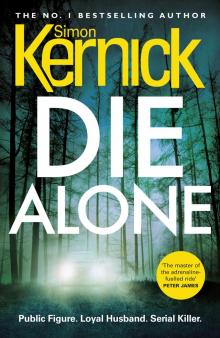 Die Alone
Die Alone Deadline
Deadline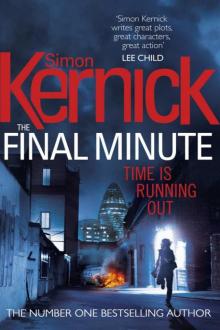 The Final Minute
The Final Minute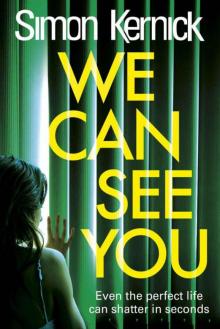 We Can See You
We Can See You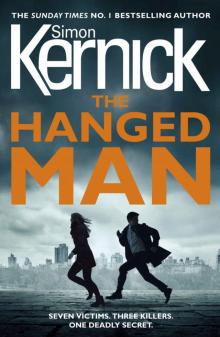 The Hanged Man (Bone Field 2)
The Hanged Man (Bone Field 2)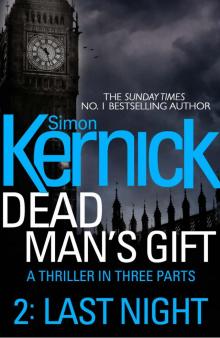 Dead Man's Gift 02 - Last Night
Dead Man's Gift 02 - Last Night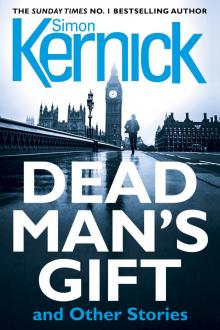 Dead Man's Gift and Other Stories
Dead Man's Gift and Other Stories A Good Day To Die
A Good Day To Die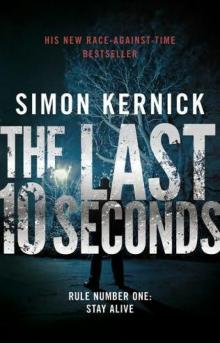 The Last 10 Seconds
The Last 10 Seconds The Murder Exchange
The Murder Exchange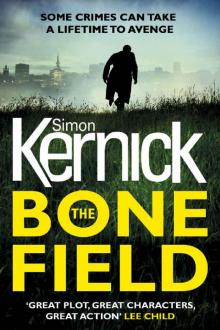 The Bone Field
The Bone Field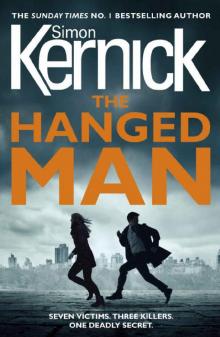 The Hanged Man
The Hanged Man Target
Target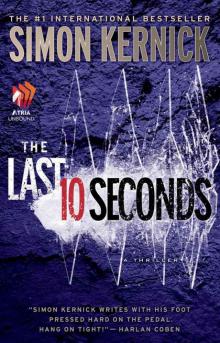 The Last 10 Seconds: A Novel
The Last 10 Seconds: A Novel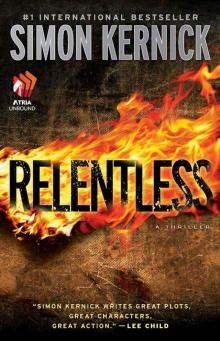 Relentless: A Novel
Relentless: A Novel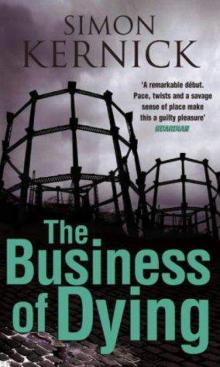 The Business Of Dying
The Business Of Dying Die Twice
Die Twice Flytrap
Flytrap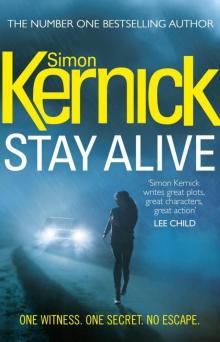 Stay Alive
Stay Alive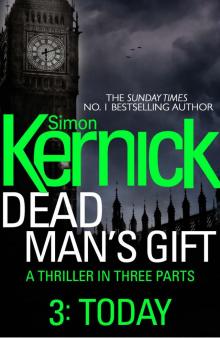 Dead Man's Gift 03 - Today
Dead Man's Gift 03 - Today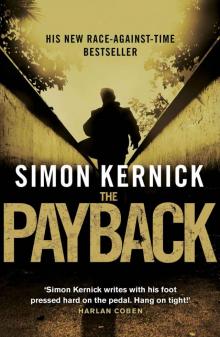 The Payback
The Payback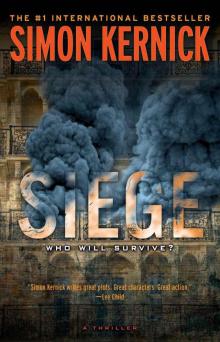 Siege: A Thriller
Siege: A Thriller The Crime Trade
The Crime Trade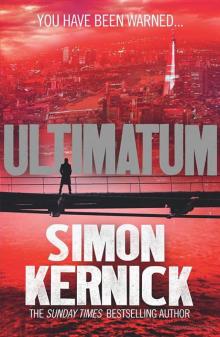 Ultimatum
Ultimatum